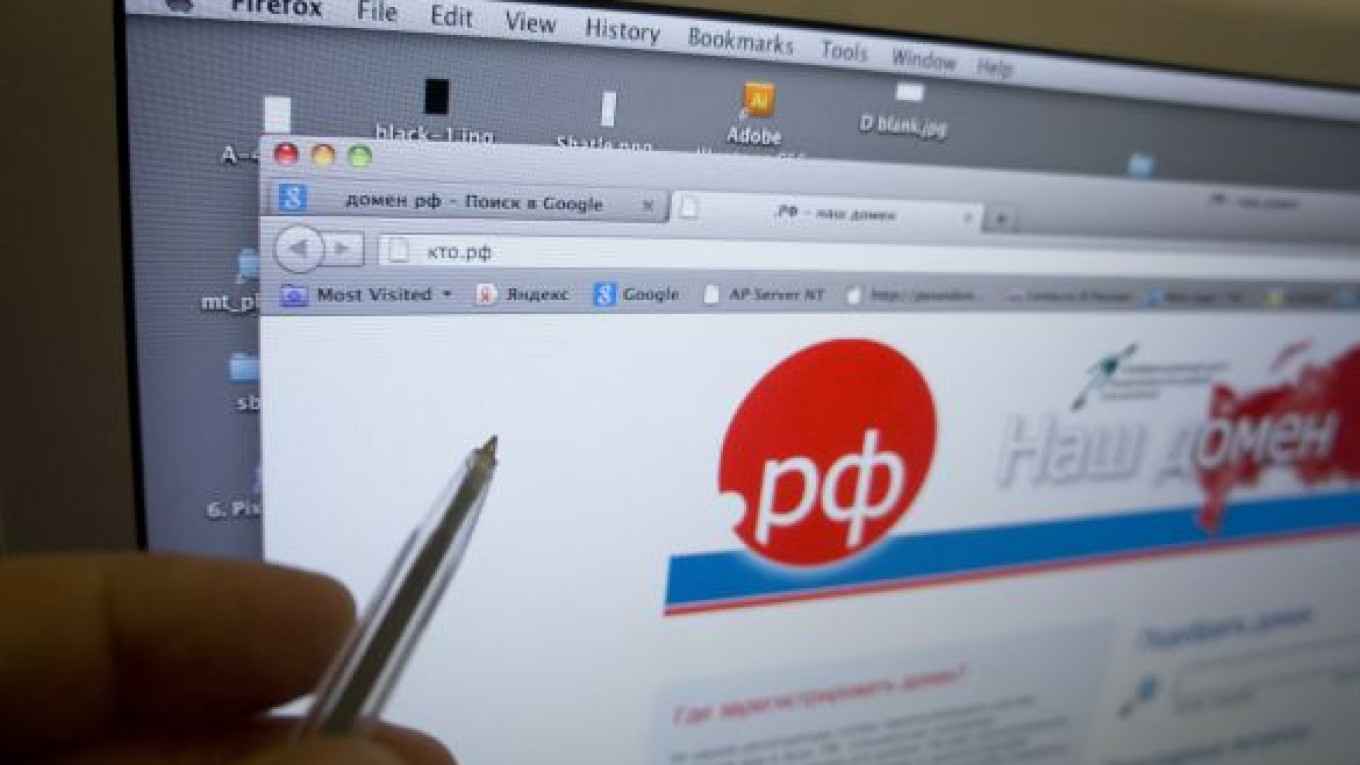Russia may not be the world champion in terms of computer use or Internet access, but when it comes to non-Latin domains the patriotic .?€?„ is the name to beat.
The Cyrillic .?€?„ domain has the most registered users and is the most successful internationalized domain experience to date, according to the 2012 World Report on Internationalised Domain Names Deployment, which the .eu registry EURid and UNESCO released this month.
An internationalized domain name is one that contains at least one label displayed in a non-Latin script or a Latin alphabet with diacritics.
"It is easy to use, especially in advertising," Andrei Kolesnikov, director of the Coordination Center for RU/? ?¤ Top-Level Domains, said in explaining the popularity of the Cyrillic domain. "It is easier to recall a domain written in a native language, while the probability of a typo when entering this domain in the browser is much lower than for those written in the Latin script."
Registration for .?€?„ opened in November 2010. As of Tuesday, there were more than 845,000 addresses registered, which makes it the biggest internationalized domain name in the world, according to the coordination center.
The domain's growth rates are also impressive. Monthly growth rates have been comparable to those of Russia's Latin-script top-level domain .ru, the EURid report states.
The .?€?„ domain grew 54 percent between December 2010 and December 2011, and it has collected 5,973 new registrants since the beginning of this month alone.
The .ru domain still has more addresses than its Cyrillic alternative, with over 4 million registered users, though it comes in only seventh in the global ranking. Domain names from Spain, Germany and the New Zealand territory Tokelau took the top three spots globally.
But while the .ru domain may not have any global accolades, it does beat out its Cyrillic alternative in terms of actual website use. According to the coordination center, 72 percent of .?€?„ domains are in use, compared with 91 percent of the .ru domains.
Giovanni Seppia, one of the authors of the EURid report, added that despite the good growth rates, the Cyrillic domain had more than 200,000 deletions at the deadline for first-year renewal.
These statistics for .?€?„ are expected to improve as the domain gets user traction.
The Cyrillic domain promises to become more popular when non-Latin e-mail addresses are supported, Kolesnikov said. Specialists from the Internet Engineering Task Force have already drafted the professional standards for supporting such e-mail address, and any glitches are expected to be resolved in two to three years.
"The domain will continue to develop, no doubt about it," Kolesnikov said. "It has great potential for further growth, and interest in the .?€?„ domain is quite high. The .?€?„ domain will continue to grow at a moderate pace. We're not expecting any more jumps in its growth."
Other countries that have non-Latin domain names include Saudi Arabia, the United Arab Emirates, Egypt, Taiwan, Jordan, Sri Lanka, Thailand, South Korea, Qatar, Palestine, Algeria, Hong Kong, Syria, Serbia and Singapore.
Russia was the first to launch a non-Latin domain name among former Soviet republics, followed two years later by Kazakhstan. The Belarussian Telegraph Agency announced last month that the domain name .?±?µ?» may appear in 2013.
Related articles:
A Message from The Moscow Times:
Dear readers,
We are facing unprecedented challenges. Russia's Prosecutor General's Office has designated The Moscow Times as an "undesirable" organization, criminalizing our work and putting our staff at risk of prosecution. This follows our earlier unjust labeling as a "foreign agent."
These actions are direct attempts to silence independent journalism in Russia. The authorities claim our work "discredits the decisions of the Russian leadership." We see things differently: we strive to provide accurate, unbiased reporting on Russia.
We, the journalists of The Moscow Times, refuse to be silenced. But to continue our work, we need your help.
Your support, no matter how small, makes a world of difference. If you can, please support us monthly starting from just $2. It's quick to set up, and every contribution makes a significant impact.
By supporting The Moscow Times, you're defending open, independent journalism in the face of repression. Thank you for standing with us.
Remind me later.


